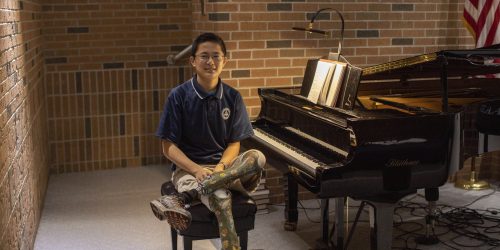
Credit: Beth Wallace
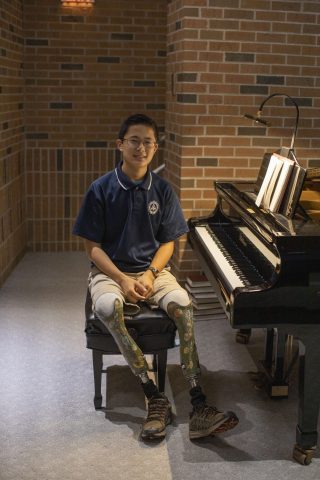
Although Great Lakes Adventist Academy (GLAA) junior Seth Mckelvey was born with fibular hemimelia, he does not necessarily consider managing his disability difficult nor does he feel that it causes him any trouble in his leadership position as class pastor.
“I haven’t really thought of it as a difficulty since I’ve grown up with it. It hasn’t even really been something [where] I’ve been like, ‘Oh, you know, I miss my actual legs.’ No, because these are my actual legs.” Seth said. “To me, it’s just the way I do things. I’ve grown up with these.”
At age two, he was adopted from China and had both of his legs amputated in the United States; he now resides with his adoptive parents in Michigan.
He may have some difficulties managing his disability, “but you would never know it as his attitude is always cheerful and positive,” says Beth Wallace, photography and yearbook teacher at GLAA.
Seth says the most notable difficulty he’s encountered is the inconvenience of having to wash his prosthetic legs and their liners every night, especially when he was younger.
The 16-year old’s positive attitude is reflected through the fact that his peers have elected him as the class pastor less than one month into this first year at the academy. Additionally, he is a Pathfinder in Teen Leadership Training and currently working on his Master Guide certification. In his free time, he enjoys outdoor activities like running, bike riding and backpacking. He also plays both the piano and organ.
He recalls one specific experience playing the organ at church. Although he struggles to press the pedals, his music director did not let that get in the way of his learning. He says that when she realized he would struggle with that, she just encouraged him to still do what he could. Although her encouragement may seem simple, it was all Seth needed to hear to realize that the people around him were not going to let the prosthetics get in the way. He realized they cared more about including him and making sure he was able to participate than his ability to press the pedals.
Seth believes it is important to include the disabled community because they are all as much a part of God’s family as anyone else. Additionally, he mentions his belief that all humans have one specific disability.
“In reality, if we look at each and every single person, we're all sinful human beings. So, technically, we all have that disability of sin,” he said.
Essentially, Seth indicates that the goal is to bring people into church to get to know Christ, no matter what they look like or what disability they have. He adds that when Jesus comes, it will not matter what disability you have. Whether you are deaf, mute, paraplegic or anything else, it will not matter since all disabilities will be gone, and that includes the disability of sin that we all have. Therefore, there is no reason to exclude someone here on earth.
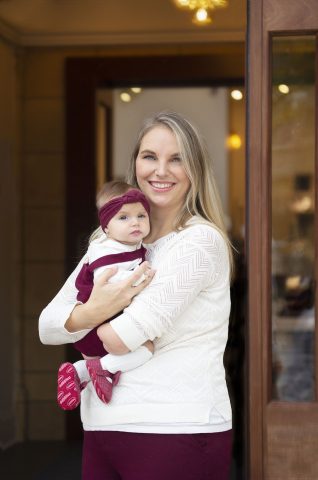
Similar to Seth, Fawn Scherencel is a congenital amputee meaning that she was born with just one hand. She says she used a prosthesis for a while growing up but doing things with one hand just always felt more natural to her. So, although her disability may bring certain difficulties for the Hinsdale Adventist Academy (HAA) principal, it is not something that ever gets in the way of her job. In fact, she says that being underestimated by others has been more of a difficulty than the actual physical obstacles her disability brings. She often feels as if people are surprised to discover she is capable of certain things.
Fawn believes that it is common in current society to underestimate disabled individuals.
“We tend to very much define people by their disability as opposed to defining people by their abilities,” she said. “We look at someone, especially someone who has a visible physical disability in some way, and that's all we see.”
She admitted that even she is sometimes guilty of this fault. To help overcome this mistaken perception, Fawn advocates that the church should “seek out individual's spiritual gifts, what their capabilities are, and find ways to not just utilize those gifts, but to make people feel included in everything.”
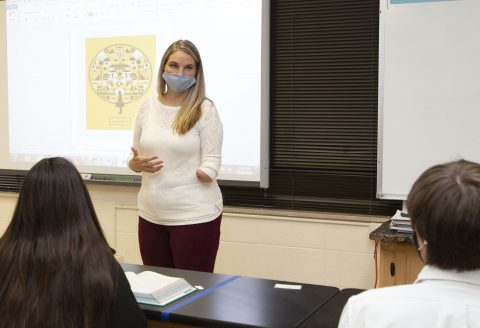
Additionally, being mindful of how a disability impacts someone can make a huge difference, stated Fawn. When planning events, taking a minute to consider whether a disabled person would be able to participate in the event or not can make all the difference. She shared the story of a staff outing to play Whirlyball, a bumper cart sport that requires one hand for driving and the other hand to hold a throwing stick. Needless to say, Fawn was not able to participate in the activity. Although she understands no one intended to exclude her, this is an example she gives of how simply being mindful or engaging in conversation would have prevented the oversight.
Seeing abilities over disabilities, mindfulness and engaging in conversation are three things Fawn finds necessary in order to be more inclusive as well as to open up leadership roles for disabled individuals. She has not forgotten it was a former principal who encouraged her to pursue a masters in leadership which ultimately played a role in her becoming a school principal.
Going forward, Fawn hopes HAA students understand that they were created for a purpose and that they are able to lead and serve wherever God takes them. She would like to be an example that anything is possible.
“If I can do it, anyone can,” she said.
Growing up, Nicolette Reynoso was the only deaf person in her six-person family. However, throughout her life, the Michigan native has been very involved in ministry for the deaf community. Her experience includes singing, interpreting, attending camp meetings and Three Angels Deaf Ministries (3ADM) where she is currently the vice president of Deaf Young Adults for Christ (DYAC). She also is on the Deaf Ministries committee. She is now married to her deaf husband, and they have five children together, two of which are also deaf. She credits God for her skills in painting and crafts.
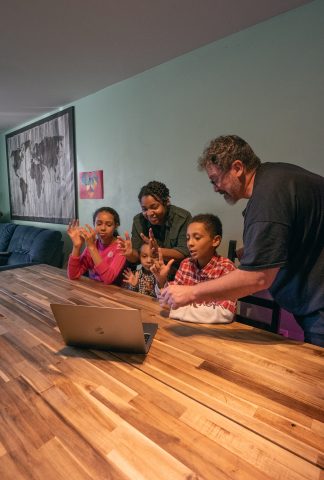
According to Nicolette, Three Angels Deaf Ministries is a resource for deaf and hard of hearing individuals. They offer easy-reading books and American Sign Language (ASL) DVD videos that help people understand Christ and the Bible better. Additionally, they provide links to the Sabbath School and worship service livestreaming from the Deaf Evangelistic Adventist Fellowship (DEAF) Church as well as the Southern Deaf Fellowship. More specifically, Nicolette works with DYAC to encourage and strengthen the faith of deaf and hard of hearing young adults. According to their website (deafdyac.org), they also hope to provide opportunities to teach leadership while preaching the gospel to deaf, hard of hearing, and even hearing individuals.
Although she is very involved now, finding her community did not come easy. When she first moved to the Washington D.C. area to attend Gallaudet University, she attended several hearing churches and had a hard time finding a place where she fit in and felt welcomed. According to Nicolette, one of the hearing churches she attended provided uncertified interpreters who did not have the necessary experience to translate to people with different levels of understanding. Despite this, she almost looked past the flaws and made this church her home church. However, what ultimately made her keep looking was her deaf daughter. She realized she wanted to attend a church where her daughter could be involved and truly learn the Word of God. She previously had met David Trexler, pastor of the DEAF church, but had not yet visited the church. It was then when she finally decided to attend the church. Nicolette claims the DEAF church changed her life as it allows her to study the Bible deeply and talk about anything.
She believes hearing churches could learn a few things from the DEAF church if they truly want to welcome everyone. For example, ensuring that deaf, hard of hearing and deafblind people can participate in most aspects of church fellowship such as Sabbath School, worship service, potluck, Bible studies, and other church activities is crucial. Taking time to understand deaf culture, the varying levels of skill, and different needs also is important, she says.
“If they want to welcome everyone, then they must find a time to learn about them and respect their cultures in order to meet their needs. Deaf, hard of hearing and deafblind don’t have to be treated like an outsider because they are different.” Nicolette said.
Joel Guerra is a PR and Business Administration major at Southern Adventist University. The young adult from Chicago enjoys social media and local journalism.